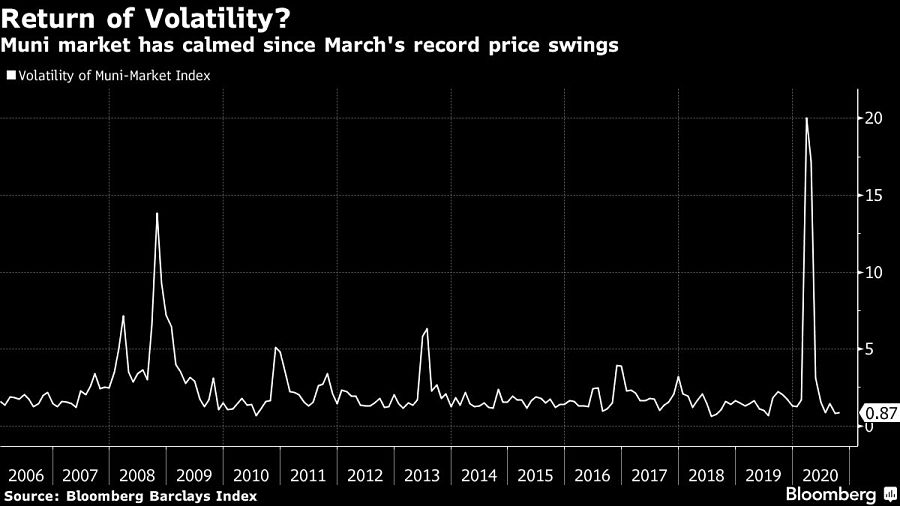

Analysts who track the $3.9 trillion municipal bond market, where prices have barely budged since late August, are bracing for a return of volatility.
The presidential race, a failure to enact another economic stimulus bill and a potential spike in COVID-19 cases during flu season could bring price swings back to the muni market, Wells Fargo Securities analyst George Huang said in an Oct. 7 note. That echoes the view of analysts at BlackRock Inc., the world’s biggest asset manager, who said they’re expecting heightened volatility as local governments rush to sell new debt before the election.
It would mark a departure from the calm that’s characterized the market since it recovered from a record sell-off in March. That has persisted even as states, cities and transit agencies have been upended by the pandemic’s financial toll, with yields holding effectively unchanged during all of August before ticking up slightly this month.
“We recommend investors be nimble with execution and prepare for potential of en masse exodus again if COVID cases spike more rapidly, if White House infections worsen, and if more meaningful stimulus talks break down yet again,” Wells Fargo’s Huang said in the note.

The muni market has seen yields slowly climb, with those on 30-year debt rising about 15 basis points since the start of last week, according to Bloomberg BVAL. Last week, investors pulled cash out of municipal-debt mutual funds for the first time in 20 weeks, according to Refinitiv Lipper US Fund Flows data. The market is facing added headwinds from a surge in debt issuance by states and cities as well as uncertainty around whether Congress will extend aid to help governments replace the tax revenue lost because of the pandemic shutdowns.
“People were waiting and seeing if something would come through, and now there’s more skepticism about that,” Huang said in an interview. He said the firm is recommending that investors move to higher-quality debt.
For investors, higher yields could mark a buying opportunity. BlackRock said in a note that the stepped-up pace of issuance this month may do just that.
“We anticipate increased volatility in the coming months, and a pull-forward of issuance ahead of the U.S. election that is similar in magnitude to the pull-forward experienced in December 2017 ahead of tax reform,” they said in a note.
Jeffrey Burger, senior portfolio manager at Mellon, said he was positioning defensively by moving to higher-quality municipal debt given the risk of volatility ahead of the election. “What we want to do is be positioned opportunistically to take advantage of that,” he said.

Relationships are key to our business but advisors are often slow to engage in specific activities designed to foster them.

Whichever path you go down, act now while you're still in control.

Pro-bitcoin professionals, however, say the cryptocurrency has ushered in change.

“LPL has evolved significantly over the last decade and still wants to scale up,” says one industry executive.

Survey findings from the Nationwide Retirement Institute offers pearls of planning wisdom from 60- to 65-year-olds, as well as insights into concerns.
Streamline your outreach with Aidentified's AI-driven solutions
This season’s market volatility: Positioning for rate relief, income growth and the AI rebound
